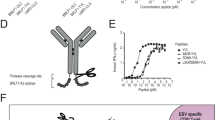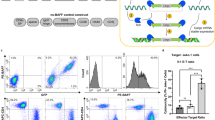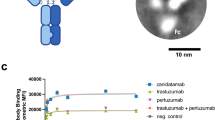Abstract
We previously demonstrated that delivery of a gene encoding an anti-erbB-2 intracellular single-chain antibody (sFv) resulted in down-regulation of cell surface erbB-2 levels and induction of apoptosis in erbB-2 overexpressing ovarian cancer cells. Based upon these findings, we hypothesized that human breast carcinomas overexpressing erbB-2 would be similarly affected by this genetic intervention. We evaluated the phenotypic effects resulting from intracellular expression of the anti-erbB-2 sFv on the human breast cancer cell lines MDA-MB-361, SK-BR-3, BT-474, MCF-7 and MDA-MB-231. Recombinant adenoviruses encoding either a reporter gene (AdCMVLacZ) or the endoplasmic reticulum (ER) directed anti-erbB-2 sFv (Ad21) were delivered to various breast cancer cell lines. Cell viability was determined by a proliferation assay and fluorescent microscopy allowed visualization of apoptotic cells. An erbB-2 ELISA quantified the endogenous erbB-2 levels of each cell line. The anti-erbB-2 sFv-encoding-adenovirus, Ad21, but not the β-galactosidase encoding adenovirus, AdCMVLacZ, was cytotoxic to >95% of the tumor cells in the MDA-MB-361 and SK-BR-3 lines, and >60% of the tumor cells in the BT-474 line. In marked contrast, the MCF-7 and MDA-MB-231 cell lines showed no change in the rate of cell proliferation following this treatment. The cytotoxic effects generated in the first three lines were a consequence of the induction of apoptosis by the anti-erbB-2 sFv. An ELISA specific for erbB-2 showed that the breast cancer cell lines most susceptible to the anti-erbB-2 sFv, MDA-MB-361, SK-BR-3 and BT-474, overexpressed the erbB-2 protein while the cell lines demonstrating no response to the anti-erbB-2 sFv, MCF-7 and MDA-MB-231, expressed the lowest levels of erbB-2. These results demonstrate that targeted killing of erbB-2 overexpressing cells via intracellular knockout can be accomplished in the context of breast carcinoma. Furthermore, erbB-2 levels in breast tumor cells may be predictive of their sensitivity to sFv-mediated killing. The ability to accomplish selective cytotoxicity of breast cancer cell lines overexpressing the erbB-2 tumor marker should allow for derivation of clinical gene therapy strategies for breast cancer utilizing this approach.
This is a preview of subscription content, access via your institution
Access options
Subscribe to this journal
Receive 12 print issues and online access
$259.00 per year
only $21.58 per issue
Buy this article
- Purchase on Springer Link
- Instant access to full article PDF
Prices may be subject to local taxes which are calculated during checkout
Similar content being viewed by others
Author information
Authors and Affiliations
Rights and permissions
About this article
Cite this article
Wright, M., Grim, J., Deshane, J. et al. An intracellular anti-erbB-2 single-chain antibody is specifically cytotoxic to human breast carcinoma cells overexpressing erbB-2. Gene Ther 4, 317–322 (1997). https://doi.org/10.1038/sj.gt.3300372
Received:
Accepted:
Issue Date:
DOI: https://doi.org/10.1038/sj.gt.3300372
Keywords
This article is cited by
-
Gene therapy for carcinoma of the breast
Cancer Gene Therapy (2006)
-
Designing a HER2/neupromoter to drive α1,3galactosyltransferase expression for targeted anti-αGal antibody-mediated tumor cell killing
Breast Cancer Research (2005)
-
Dominant negative knockout of p53 abolishes ErbB2-dependent apoptosis and permits growth acceleration in human breast cancer cells
British Journal of Cancer (2002)
-
Overexpression of ErbB2 in cancer and ErbB2-targeting strategies
Oncogene (2000)



